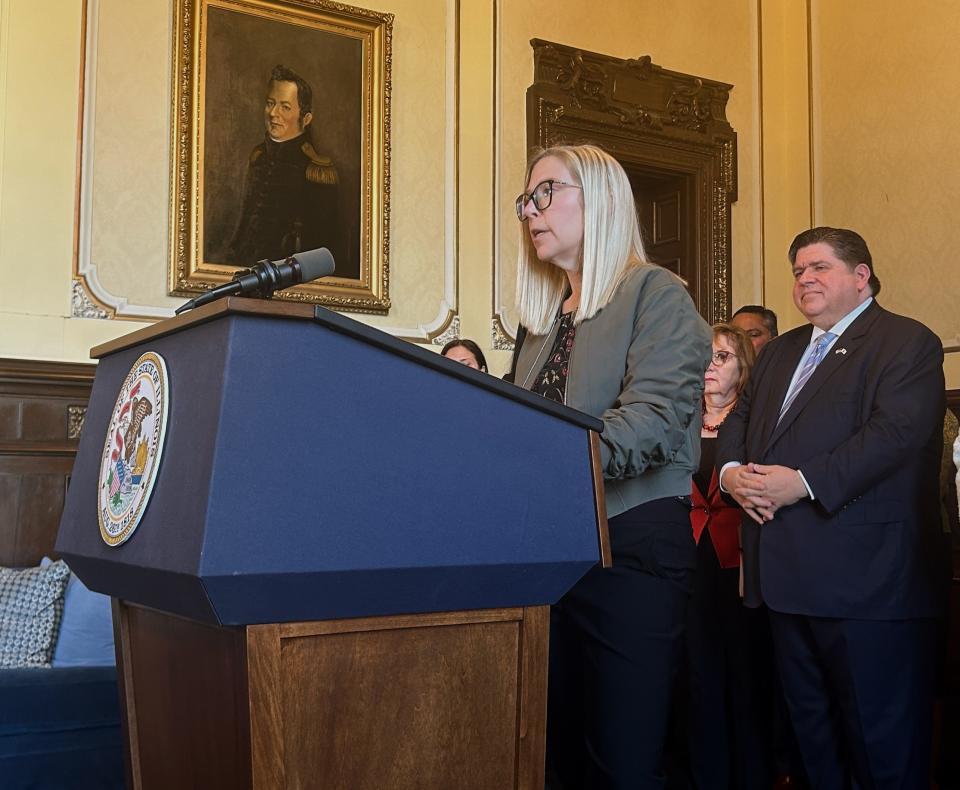Illinois bills targeting 'ghost networks' advancing through General Assembly
- Oops!Something went wrong.Please try again later.
Healthcare insurers could face more stringent regulations and severe fines through legislation advancing in the Illinois General Assembly.
The state's Network Adequacy and Transparency Act requires insurers to keep an up-to-date provider directory, listing healthcare professionals that are in-network for its customers. However, these directories sometimes list providers no longer taking new patients, who have moved or are no longer in practice creating what are called "ghost networks."
Legislation pushed by Gov. JB Pritzker would buttress the 2017 law by ensuring provider-per-patient ratios, maximum travel time and distance and appointment wait time standards adhere to federal law. More severe penalties would also be levied for issuers not adhering to the law.
Failing to update a provider network at least once per month could see issuers face a $5,000 fine for each month of non-compliance. Additionally, the Illinois Department of Insurance could institute another $1,000 penalty if an insurer does not update their network adequacy listing within 15 days.
More: New report finds 2 Springfield hospitals in compliance with pricing transparency laws

The issue of ghost networks became a local matter in 2021 when Springfield Clinic and Blue Cross Blue Shield of Illinois severed its contract. During that time, anywhere from 55,000 to 110,000 patients were affected and were forced to find new doctors.
Blue Cross and the clinic ended its years-long tiff late last year with a new five-year contract, but the out-of-network period's impact was severe especially for families having babies, said Dr. Leslie Dignan-Moore, an obstetrician and gynecologist at Springfield Clinic.
The insurer listed 99 OB-GYNs outside of the clinic, but with many not providing outpatient care or requiring lengthy trips, only four providers were truly available. Dignan-Moore said wait-times grew to months as a result.
"That is just completely unacceptable," she said during a recent press conference at the governor's Capitol office. "Helplessness swept over our patients during that timeframe, they realized the lack of alternative options for care."
Rep. Sue Scherer, D-Decatur, tried previously to tackle ghost networks with a bill which also would have issued penalties, albeit more severe than Pritzker's proposal. It was ultimately rejected in a House vote two years ago, with many lawmakers deciding not to cast a vote on the measure.
More: Voter turnout, incumbency advantages and more: 5 takeaways from primary election
Pritzker's healthcare package
Health insurance reform is a chief priority for Pritzker this legislative session, previously calling for lawmakers to take-up a series of changes during his State of the State address last month.
The Democratic governor expects a fight from health insurers, where Springfield-based Illinois Life and Health Insurance Council is in opposition. Blue Cross declined to comment on the proposed legislation.
Companies like Blue Cross have been issued penalties by the state in the past for having out-of-date or otherwise inadequate directories. Fines to Blue Cross' parent company totaling more than $1.2 million since 2022. The problem, however, has still persisted.
"This is a practice meant to turn a profit without providing patients with the quality and timely care that they need," Pritzker said.
More: US senators urge Biden to create national monument to honor Springfield philanthropist
The language of Pritzker's proposal is listed in House Bill 5395, which advanced out of a House committee Thursday. It will return with further amendments before a full floor vote.
Passage of the legislation would ban prior authorization requirements for people to receive in-patient treatment at a psychiatric facility as well as all forms of so-called “step therapy” for prescription drug coverage. Step therapy refers to the practice of requiring a patient to try one or more cheaper, alternative medications before being allowed to access medications prescribed by their doctor.
Dr. Mary Dobbins, a pediatrician and child psychiatrist at Southern Illinois University School of Medicine, said the shortage of medical professionals is exacerbated by these restrictions on children healthcare.
"What's especially frustrating about this is that a lot of the insurance review is done by people who are not physicians or, even if they have a physician review, they are typically adult physicians who may not give appropriate recommendations for children," she said.
Other changes in the plan include requiring insurance companies to publicly post the types of treatments and therapies that do require prior authorization; and banning the sale in Illinois of short-term, limited duration insurance plans that don’t meet the minimum standards under the federal Affordable Care Act.
Ghost networks could also be addressed through a standalone bill led Rep. Margaret Croke, D-Chicago. House Bill 5313 advanced out of committee unanimously and now awaits a vote in the House chamber.
Peter Hancock of Capitol News Illinois contributed to this report.
Contact Patrick M. Keck: 312-549-9340, pkeck@gannett.com, twitter.com/@pkeckreporter.
This article originally appeared on State Journal-Register: Bills targeting 'ghost networks' moving forward in Illinois

